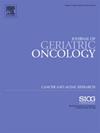老年妇女在决定早期乳腺癌治疗时对生活质量和生命长度的偏好:缩小年龄差距研究的横断面子分析
IF 3
3区 医学
Q3 GERIATRICS & GERONTOLOGY
引用次数: 0
摘要
本文章由计算机程序翻译,如有差异,请以英文原文为准。
Preferences for quality of life versus length of life in older women deciding about treatment for early breast cancer: A cross-sectional sub-analysis of the Bridging the Age Gap study
Introduction
Prioritising quality of life (QoL) or length of life is often necessary in the decision-making process for cancer care. This may be complicated in patients with limited life expectancy due to age and comorbidities. Older women with early breast cancer often receive non-standard care (primary endocrine therapy [PET] or omission of chemotherapy or radiotherapy) to reduce treatment morbidity and maintain QoL. We aimed to determine the perceived relative influence of QoL versus length of life in treatment decision making by older women with early (potentially curable) breast cancer.
Materials and Methods
This was a sub-study of the Age Gap multi-centre, cohort study, which prospectively recruited women >70 yrs. with early breast cancer. Baseline demographics, health characteristics, and QoL scores were analysed alongside a bespoke questionnaire to assess QoL and length of life preferences, including a modified version of the validated quality/quantity questionnaire, in a subset of the main study.
Results
The questionnaire was sent to 308 patients and 194 (63 %) were returned by participants with a median age of 75 years (range 70–93). Of these, 14 had PET and 180 had standard treatment (ST) (surgery +/− adjuvant therapy) including 37 who had chemotherapy. The PET group was older (median age 83.5 versus 76 years) and in poorer health (9/14; 64.3 % patients had one or more comorbidities versus 69/144; 47.9 %) with inferior baseline physical domain QoL scores. Patients who received PET valued QoL and length of life equally (Q score 0.87, L score 0.91), and patients who received chemotherapy favoured length of life over QoL (Q score 0.67, L score 0.86). Subgroup analysis showed a small correlation between increasing age and QoL preferences (Spearman's r = 0.2, P < 0.009). There was no correlation between co-morbidities, frailty, or global QoL and length of life/QoL preferences.
Discussion
Older women with early breast cancer valued length of life and QoL highly, with an association between preference for QoL and less aggressive treatment choices. Relative QoL preference increased with advancing age. More research is needed to define QoL determinants and outcomes following treatment to help patients make decisions that reflect their priorities.
Trial Registration Number
ISRCTN: 46099296.
求助全文
通过发布文献求助,成功后即可免费获取论文全文。
去求助
来源期刊

Journal of geriatric oncology
ONCOLOGY-GERIATRICS & GERONTOLOGY
CiteScore
5.30
自引率
10.00%
发文量
379
审稿时长
80 days
期刊介绍:
The Journal of Geriatric Oncology is an international, multidisciplinary journal which is focused on advancing research in the treatment and survivorship issues of older adults with cancer, as well as literature relevant to education and policy development in geriatric oncology.
The journal welcomes the submission of manuscripts in the following categories:
• Original research articles
• Review articles
• Clinical trials
• Education and training articles
• Short communications
• Perspectives
• Meeting reports
• Letters to the Editor.
 求助内容:
求助内容: 应助结果提醒方式:
应助结果提醒方式:


